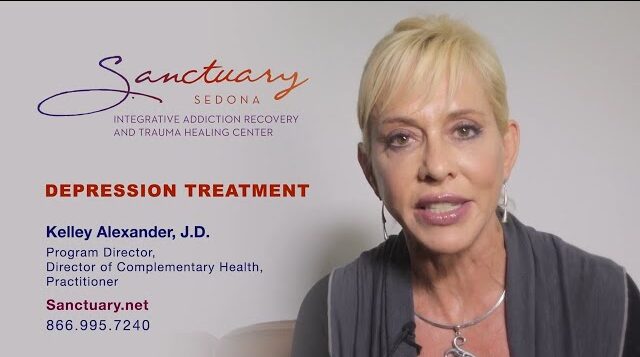Our All-Inclusive Depression Treatment Program
At The Sanctuary at Sedona, our goal is to encourage your mind, body, soul and spirit back into a state of balance so that depression naturally subsides. While we may incorporate common methods for treating depression into your all-inclusive depression program, we take a more comprehensive approach. Our blend of holistic therapies with traditional treatments like psychotherapy enhances the overall effectiveness of your healing journey.
Our 30-day depression recovery program is all-inclusive. Every clinical therapy, our integrative treatments, the luxurious retreat amenities and our advanced alternative regimen are included in the price of your care.
Let’s explore what’s included at our all-inclusive depression center in Arizona and what’s different about our approach.
Psychiatric and Medication Assessment
Many mental health professionals use medication as a first line of defense for treating depression. While medications certainly help some people ease their depression symptoms, they may actually cause the chemical imbalance they’re purported to fix.
The Sanctuary’s clinical team is led by a board-certified psychiatrist. We are happy to review the medications you’re currently taking to ensure your regimen makes sense for you. However, prescription medication is not our primary go-to and does not serve as the backbone of our program.
Real change occurs when the brain adapts to different habits and begins to operate more normally. To help you reach this place, we focus on healing you from the inside out instead of simply managing symptoms with medication.
Clinical Evidence-Based Therapies
Clinical therapy, also known as psychotherapy, is a valuable tool in the treatment of depression. It consists of talking with a therapist who can help you identify the negative thought patterns that lead to your depression and replace them with truer, more positive ones.
At The Sanctuary, our 30-day depression program includes over 160 clinical treatment hours with an experienced depression counselor. While we offer daily group sessions, our focus is individualized, private care that helps you feel protected, seen and heard.
Depression therapy is profound work, which is why we offer an abundance of clinical therapeutic models like cognitive behavioral therapy (CBT), dialectical behavior therapy (DBT) and interpersonal therapy. These science-backed therapies can help you:
- Develop healthy coping strategies
- Set goals for changes you want to make
- Adjust to the challenges you’re facing
- Learn how to manage stress
- Provide a place to talk about what’s going on
Integrative Holistic Therapies
While conventional treatment focuses only on the psychological aspects of depressive symptoms, holistic treatment concentrates on healing your whole self from depression. At The Sanctuary, we connect our clients with an abundance of alternative therapies from a wide variety of disciplines. Each technique is integrated into your depression treatment program to address the mental, physical and spiritual conditioning that underpin this mental health condition.
We do not view holistic therapies as add-on treatments. Instead, we include all complementary modalities in the cost of care, including optional Ketamine-Assisted Therapy (KAT) for treatment-resistant depression and customized wellness IVs.
Explore how our integrative, holistic approach employs advanced strategies for:
- Healing the brain using a brain-healthy, anti-inflammatory diet, natural supplements and brain-calming activities like meditation and eco-therapy.
- Healing the body using bodywork to release depression from where it lives in your cells.
- Healing the spirit using energy medicine to address the larger energetic causes of depression and release it from your energetic field.
- Healing the soul using ritual, ceremony and therapeutic creativity to help you reconnect to your essence and restore your passion for life.
Call Us Today Contact Us

